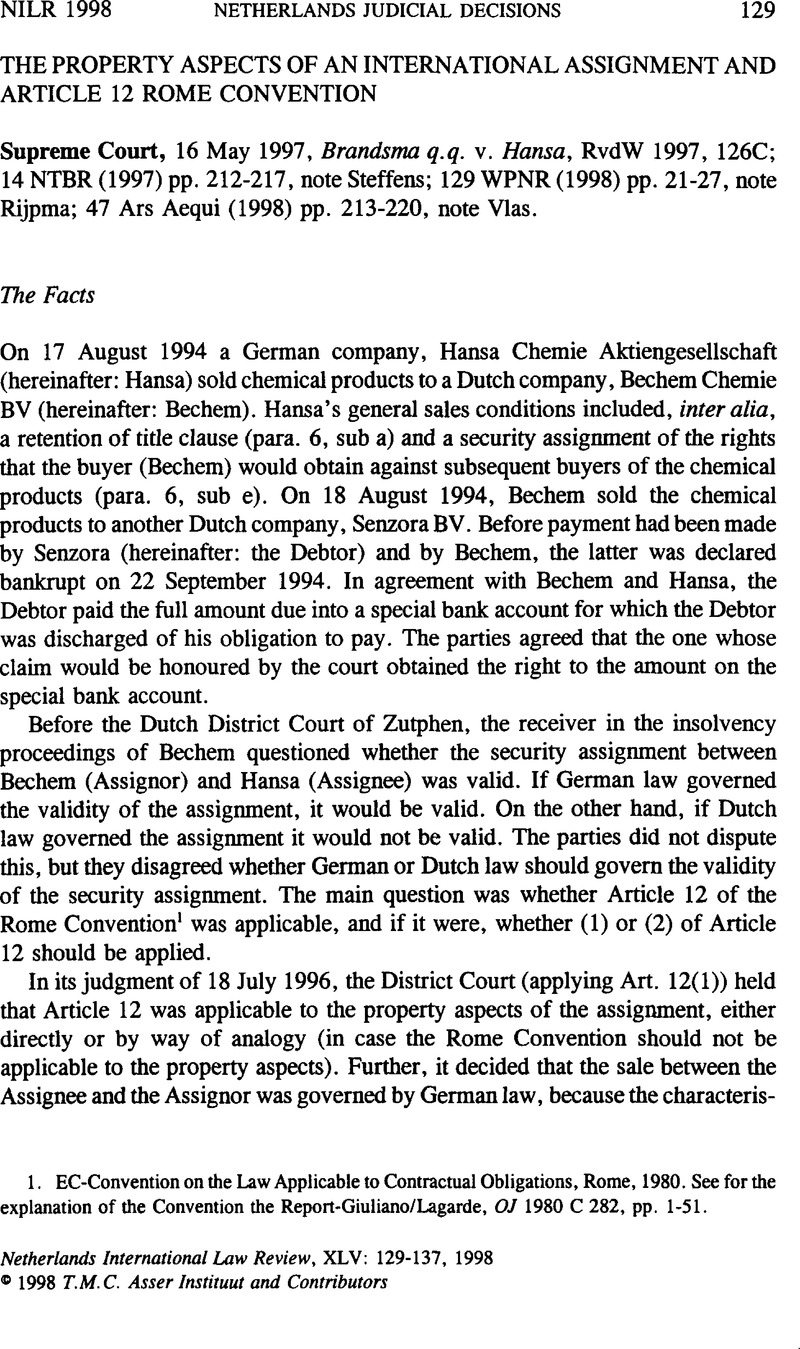Published online by Cambridge University Press: 21 May 2009

1. EC-Convention on the Law Applicable to Contractual Obligations, Rome, 1980. See for the explanation of the Convention the Report-Giuliano/Lagarde, OJ 1980 C 282, pp. 1–51.
2. See L.F.A. Steffens, Overgang van schulden en vorderingen in het Nederlandse intemationaal privaatrecht [The transfer of debts and claims in Dutch private international law], Thesis Leiden (Deventer, Kluwer 1997) p. 376 (English summary).
3. Art. 3:84, sub 3 Civil Code (CC) forbids a security transfer and a fiduciary transfer, although the security transfer has been given somewhat latitude by the Dutch Supreme Court in the case of Sogelease (HR 19 May 1995, NJ 1996 No. 119, note Kleijn). This article was introduced in the new Dutch Civil Code, which has been in force from 1 January 1992.
4. Since the new Dutch Civil Code has been introduced, notice is an imperative requirement for the property transfer to have effect (Art. 3:94(1) CC). In the proceedings before the District Court, the receiver in the bankruptcy of the Assignor further argued that it concerned the assignment of a future claim, which was not sufficiently ascertainable at the time of the assignment. This would have been against Arts. 3:97(1), in connection with 3:84(2), in connection with 3:239(1) Dutch CC. The District Court found the opposite, because only the claims that flowed from sales of the German chemical products, would qualify for assignment. This is in agreement with the Dutch Supreme Court decision of 11 June 1993, NJ 1993 No. 776, 42 NILR (1995) p. 131, note Van der Weide.
5. A/CN.9/445 (21 November 1997).
6. Lando, O., “The EC Draft Convention on the Law Applicable to Contractual and Non-Contractual Obligations’, 38 RabelsZ (1974) pp. 6–55 at p. 47.Google Scholar
7. For the original version and commentary see M. Giuliano, ‘Rapport concernant I'avant-projet de convention sur la loi applicable aux obligations contractuelles et non-contractuelles’, in O. Lando, et al., eds., European Private International Law of Obligations (Tübingen, Mohr 1975)pp. 220–314.
8. P. Lagarde, ‘Le nouveau droit international privé aprés l'entrée en vigueur de la Convention de Rome du 19 juin 1980’, 80 Rev.crit.dr.int.privé (1991)p. 335; A. Sinay-Cytermann, ‘Les conflits de lois concernant l'opposabilité des transferts de créance’, 81 Rev.crit.dr.int.priv. (1992) p. 43; Y. Loussouam and P. Bourel, Droit international privé (Paris, Dalloz 1993) no. 425.
9. C. Reithmann and D. Martiny, Internationales Vertragsrecht(Cologne, Verlag Otto Schmidt 1996) no. 300.
10. See Plender, R., The European Contracts Convention (London, Sweet & Maxwell 1991)Google Scholar no. 11.18; , Kropholler, Internationales Privatrecht (Tübingen, Mohr 1997) para. 52 VII, 1; Rheitmann and Martiny, op. cit. n. 9, no. 307; A. Heini, etal., eds., IPRG-Kommentar, Kommentar zum Bundesgesetz über das Internationale Privatrecht (IPRG) vom 1. Januar 1989 (Zurich, Schulthess Verlag 1993), comment on Art. 145, p. 1246; Lando, loc. cit. n. 6, at p. 47.Google Scholar
11. Swiss Law on Private International Law. This Article does not grant unlimited freedom. The choice is subjected to the permission of the debtor and can never be invoked against third parties. IPRG-Kommentar, op. cit. n. 10, comment on Art. 145, p. 1247.
12. IPRG-Kommentar, op. cit. n. 10, comment on Art. 145, pp. 1248, 1250; Rheitmann and Martiny, op. cit. n. 9, no. 300; , Dicey and , Morris, Conflict of Laws (London, Sweet & Maxwell 1993) pp. 979–980.Google ScholarPubMed
13. First Protocol (89/128/EC) and Second Protocol (89/129/EC) on the Interpretation by the Court of Justice of the European Communities of the Convention on the Law applicable to Contractual Obligations opened for signature in Rome on 19 June 1980, Brussels, 19 December 1988.